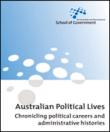'Shortly after Frank Crowley, then lecturing in history at the University of Western Australia, started his biography of John Forrest, he confronted his second-year students with a question: ‘It is said that every historian should tackle a biography at some stage in his life. What do you think?’ As I recall, the second-year students sat there with their mouths opening and closing silently like dyspeptic goldfish. One of them, however, for some reason remembered that remark. Thirty years later I recalled it when I was trying to work out what my next project should be, having just worked on the official history of Australia’s involvement in Malaya, Borneo and Vietnam, as well as various other projects. I wanted to do something which built on that work but which was also different. I thought that tackling a biography would be of interest. It occurred to me that somebody really ought to do a biography of the public servant Arthur Tange, a person to whom many historians, myself included, had referred with a one-word summary, either ‘legendary’ or ‘formidable’.' (Introduction)



